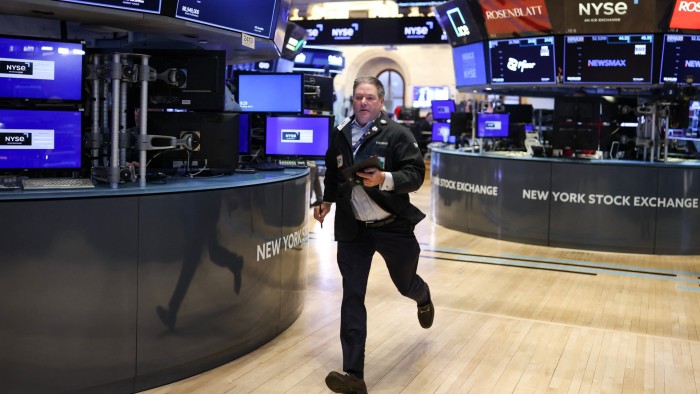Unlock the Editor’s Digest for free
Roula Khalaf, Editor of the FT, selects her favourite stories in this weekly newsletter.
The writer is co-founder and chief investment strategist at Absolute Strategy Research
Donald Trump has weaponised trade with his “liberation day” tariffs. Up until the announcement, investors had fixated on how the tariff details will impact the stocks in their portfolios. But it is clear the impact will be much broader and consequential. And there is one key risk investors need to appreciate — the potential for tariffs lead to a reduction in capital flows.
The first risk is that capital is reallocated away from the US, towards non-US markets. Investor surveys, including by my firm, suggest that this is a trend that is under way and will accelerate. ETF flows also have shifted towards non-US vs US funds in the past six months.
The second risk is from reduced cross-border capital flows as trade imbalances fall. Current accounts and capital accounts are inherently linked. The absolute size of current account surpluses and deficits maps closely on to the estimate of cross border capital flows by the Bank for International Settlements. If American tariffs reduce the US trade deficit, then cross-border capital flows will also probably decline.
This could have a major impact on US non-bank financial institutions which I calculate now account for 70 per cent of US private sector financial assets. Accessing the large pool of global cross-border capital has contributed to their rapid growth. Their ability to re-intermediate global savings into the US economy in listed and private asset classes has been critical to the robust growth of the US economy since the financial crisis. Reduced access to global capital could constrain not only these institutions, but also those US economic activities that have depended on them for financing. This is something the president’s team may have underestimated.
The third risk is the potential repatriation of funds, as capital becomes increasingly weaponised. International investors have already seen their share of US Government debt fall from 33 per cent in 2015 to 24 per cent in 2024. This will clearly fall further if foreign investors see the US as an increasingly unreliable partner and funds are repatriated in response to US tariffs.
Stephen Miran, chair of the Council of Economic Advisers, goes as far to suggest in an influential paper that because “China does not have a good record abiding by [US] trade deals . . . the US ought to therefore demand some security — for instance, China’s Treasury portfolio in escrow”. This approach seems guaranteed to reduce international investor willingness to hold US debt.
There are also implications for equities. International ownership of US equities has risen almost continuously over the past 20 years (and is now 18 per cent of US market capitalisation). A strategic decision by international investors to repatriate funds in retaliation against US trade actions, or simply to pay for increased defence spending, could result in an equity sell-off that could impose significant negative US wealth effects.
America’s vulnerability to retribution and repatriation highlights how a world of “self-sufficient production” is likely to see a shift towards “self sufficient capital”. This may be why the US Administration is rapidly pushing ahead with its sovereign wealth fund. A large-scale privatisation programme, alongside the sale of government-owned land, could easily see the US fund become larger than the Norges Bank’s $1.8tn. This pool of capital could help offset the loss of access to global funds, and support nascent US businesses and key strategic industries.
A world of reduced global capital availability will create even greater problems for the EU. European growth could struggle if local pools of private sector capital are not large enough to sustain major new investments. This would place ever greater demand on EU official capital for funding investment in defence, infrastructure, and energy. Without a rapid move towards an EU Capital Markets Union, the EU may face an existential risk. The situation for the UK is even worse, making a rapid, expansion of a National Wealth Fund imperative.
While it is easy to focus on the immediate risk to global trade from US tariffs, the bigger investment risk may be from the resulting decline in global portable capital. The more the US administration weaponises trade and the dollar, the greater the risk that it prompts active capital repatriation. Indeed, as the international structures that promoted free trade since the 1980s are unwound, the greater the risk that we return to the capital controls of the 1960s and 1970s.
https://www.ft.com/content/c5648017-2357-4dc1-a33b-809bd8561275


